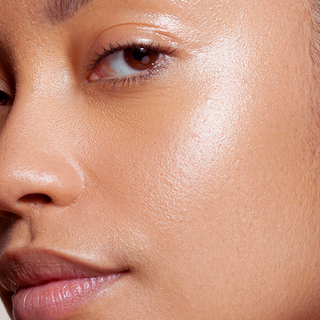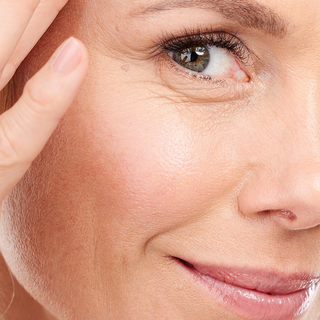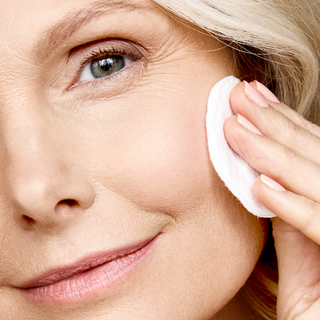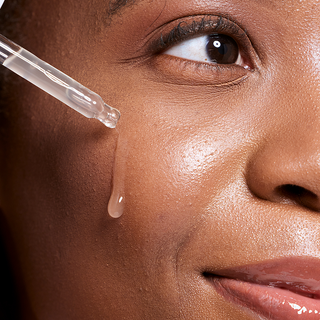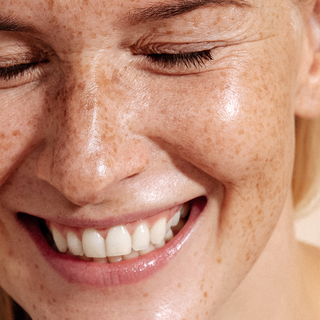Peptides are having a major skincare moment, and for good reason. But with hundreds of peptide creams and serums on the shelves, how do you know which ones actually deliver results?
In this guide, we’ll break down the most effective peptides for every skin goal, from softening crow’s feet to boosting your barrier. Let’s dive in!
What Are Peptides, And Why Should Your Skin Care?
Peptides are short chains of amino acids, the building blocks of proteins like collagen, elastin, and keratin. These proteins are what give our skin its structure, firmness, and that healthy, youthful bounce we’re all chasing (especially after 30).
As we age, our natural production of these proteins slows down, and the visible results show up as fine lines, sagging, and dullness. That’s where peptides come in.
Applied topically, certain peptides act like little "cellular messengers," signaling your skin to kick back into gear, boosting collagen, repairing the barrier, even calming inflammation. Dermatologists even describe them as repair instructions in a bottle.
Are Peptides Dermatologist-Recommended?
Absolutely. Signal peptides and copper peptides in particular have been clinically backed and dermatologically endorsed for their firming, healing, and rejuvenating effects.
But here’s something I tell every client: Not all peptides are created equal.
Just because a product says "peptide" on the label doesn’t mean it’s effective. It’s about how the formula is delivered, what else it’s paired with, and whether the concentration is actually high enough to make a difference.
Peptides need the right environment to thrive, think proper pH, smart packaging, and synergistic ingredients like niacinamide and hyaluronic acid. That’s why every peptide-based formula I create is intentionally designed, not just to look good on a shelf, but to transform skin in real life.
The 4 Major Types Of Peptides (And What Each One Does)
Peptides are a diverse group, and if there’s one thing I’ve learned after over a decade of treating skin, it’s that choosing the right kind of peptide for your concern makes all the difference. This isn’t about slapping on a "peptide serum" and hoping for the best. It’s about targeted performance.
Here’s how each peptide type plays a different role in your skin’s transformation:
Signal Peptides
If your skin feels like it’s lost its bounce, or you’re starting to notice fine lines where there weren’t any before, signal peptides are your best friend.
These peptides (like Matrixyl, a.k.a. Palmitoyl Pentapeptide-4) act like text messages to your skin cells, saying: "Hey, make more collagen!" And your skin listens. They’re the go-to for boosting firmness, improving elasticity, and bringing back that youthful snap.
💡 Why I love them: I’ve built multiple Maria Kane products around these because they give visible results, without the dryness or flaking that comes with more aggressive ingredients.
→ Check out: Overnight Youth Booster
Carrier Peptides
These peptides are like delivery drivers, but instead of pizza, they bring your skin the good stuff: trace elements like copper and magnesium that supercharge your repair system.
The most famous? GHK-Cu (Copper Tripeptide-1). This one does a bit of everything, firms, heals, brightens, and even helps reduce scarring from breakouts. It’s fantastic for barrier repair, especially if your skin’s been through it lately (hi, retinol overuse).
✨ Real-life bonus: Copper peptides are also safe during pregnancy, which makes them a staple for moms in my clinic looking to rebuild firmness after baby, without harsh actives.
→ Check out: Nourishing HA Peptide Serum
Neurotransmitter Peptides
These are the smooth operators of the peptide world. Neurotransmitter peptides like Argireline work by relaxing the tiny facial muscles that cause expression lines.
Think of it as a topical, non-invasive alternative to Botox.
They don’t freeze your face, but they do help soften crow’s feet, forehead lines, and tension around the mouth when used consistently. Perfect for someone who wants gentle, preventative smoothing, without the needles or the drama.
🙋♀️ Pro tip from the treatment room: These peptides pair beautifully with signal peptides for a one-two punch of prevention and repair.
→ Check out: Dynamic Eye Renewal Cream
Enzyme-Inhibitor Peptides
As we age, our skin naturally starts to break down collagen faster than it can rebuild it. Enzyme-inhibiting peptides are here to slow that roll.
These peptides block the enzymes that degrade collagen and elastin, keeping your skin firm for longer. Some, like rice- and soy-derived peptides, also help with hyperpigmentation and dullness, making them ideal for photoaged or sun-damaged skin.
🌞 Why this matters: If you’ve spent years chasing a tan or dealing with melasma, these peptides can help reinforce your barrier and keep future pigment issues at bay.
→ Check out: Brightening CE Ferulic Serum
The Best Peptides For Common Skin Concerns
Whether you’re dealing with fine lines, breakouts, or post-inflammatory redness, the right peptide can do more than just moisturize, it can transform your skin on a cellular level.
This isn’t about piling on products.
It’s about choosing formulas that are targeted, efficient, and designed to work with your skin’s natural repair mechanisms. Below is a peptide-powered cheat sheet. Bookmark it, print it, share it with your best friend, it’s that good.
🧬 Skin Concern: Fine Lines & Wrinkles
Recommended Peptides: Signal peptides (like Matrixyl) + Argireline
Why it Works: These peptides stimulate collagen and reduce repetitive muscle movement that deepens expression lines.
MK Highlight: Nourishing HA Peptide Serum
Combines Matrixyl-like peptides with niacinamide and hyaluronic acid for hydration, elasticity, and smoothing. It’s my go-to for clients who want to visibly soften fine lines without irritation.
🧬 Skin Concern: Loss Of Firmness
Recommended Peptides: Copper peptides (GHK-Cu)
Why it Works: Copper tripeptides support collagen synthesis, skin regeneration, and elasticity.
MK Highlight: Nourishing HA Peptide Serum
The serum’s synergistic formula of peptides and niacinamide combo helps firm, tone, and brighten while rebuilding the skin barrier. A favorite among postpartum moms looking for visible lift.
🧬 Skin Concern: Uneven Texture & Dull Tone
Recommended Peptides: Palmitoyl Tripeptide-1 + Retinol
Why it Works: Retinol encourages cell turnover, while peptides reinforce the skin as it renews, perfect duo for refined texture and glow.
MK Highlight: Overnight Youth Booster
This powerful nighttime treatment blends peptides, 4% niacinamide, and a gentle, medical-grade retinol. Your skin literally wakes up smoother.
🧬 Skin Concern: Inflammation Or Sensitivity
Recommended Peptides: Tetrapeptide-7, Oligopeptides
Why it Works: These calming peptides reduce redness, restore the barrier, and soothe stressed-out skin, without clogging or irritating.
MK Highlight: Soothing Peptide Cleanser
This non-stripping formula cleans while delivering calming peptides and botanical extracts. It's gentle enough for rosacea-prone or post-treatment skin.
🧬 Skin Concern: Acne-Prone Or Oily Skin
Recommended Peptides: GHRP-6, Enzyme-inhibitor peptides
Why it Works: GHRP-6 helps regulate oil production, while enzyme inhibitors protect collagen and minimize post-acne marks
If you’re struggling with multiple concerns (and let’s be honest, most of us are), look for multi-tasking peptides that address more than one issue at once. That’s exactly how we designed our peptide lineup, minimalist routines, maximum payoff.
What People Ask Our Team About Peptides
After years in the treatment room, I can tell you, everyone’s asking the same handful of questions when it comes to peptides.
Here’s what you really need to know before adding peptides to your routine:
Can Peptides Break Me Out?
Most peptides themselves are non-comedogenic, meaning they won’t clog pores.
But here’s the catch: the formula they’re in might.
Rich creams with occlusive agents (especially when overloaded with actives) can sometimes lead to congestion, especially for oily or acne-prone skin types.
So if you're acne-prone? Reach for a peptide serum (hello, Nourishing HA Peptide Serum!), not a heavy cream, and make sure it's been tested on real, reactive skin.
Can I Use Peptides With Retinol Or Vitamin C?
Yes, yes, yes, but timing and order matter.
Here’s how I coach my clients:
-
AM Routine: Cleanse → Vitamin C serum → Peptide serum → Moisturizer → SPF
-
PM Routine: Cleanse → Retinol → Peptide serum → Moisturizer
Peptides pair beautifully with both Vitamin C and retinol when used correctly. Just avoid layering them directly on top of each other, especially if your skin is sensitive.
If you're brand new to actives, alternate days to build tolerance, your glow will thank you.
Is It Okay To Use Multiple Peptides Together?
Yes! In fact, many of the most effective formulas (like ours) combine 2–4 complementary peptides to address multiple concerns at once, like hydration, firmness, and calming inflammation.
But here’s a word of caution: don’t mix and match brands blindly.
Why? Because peptides operate best within a pH range of 5 to 7.Layering products with incompatible pH or redundant peptides can lead to irritation or nullify their benefits. Always choose a well-formulated blend where synergy, not chaos, is the design.
And when in doubt? Simplify. Two targeted peptide products used well will outperform a chaotic routine every time.
Are There Any Drawbacks To Peptides?
I love peptides. I formulate with them, I recommend them, I use them every single day. But I’m also not here to sugarcoat your skincare.
Like every powerful active, peptides have nuances, and knowing them can mean the difference between radiant results and “meh” disappointment.
Here’s the honest truth:
❌ They May Feel Tight Or Drying If Overused
This is one concern that doesn’t get enough airtime. Peptides, especially signal peptides, can feel tightening on the skin, especially when layered with other actives or used too frequently.
That doesn’t mean they’re drying per se, but if the formula lacks hydrating partners like hyaluronic acid or glycerin, your skin might feel “pulled.”
💡 My fix: Every Maria Kane peptide product is formulated with a hydration-first mindset. Our Nourishing HA Peptide Serum blends firming peptides with niacinamide and humectants to prevent that uncomfortable tightness.
❌ They Take Time To Work
If you’re the kind of person who expects instant results from a new serum… you might be disappointed. Peptides are builders, not exfoliators. They work gradually to strengthen, firm, and fortify.
You’ll typically start to see:
-
Hydration improvement: within 1–2 weeks
-
Barrier strength + reduced sensitivity: 3–4 weeks
-
Visible wrinkle smoothing or firmness: 6–12 weeks of consistent use
In other words, give your peptides time to train your skin. They’re in it for the long game.
Peptides Aren’t Just Hype, They’re A Skincare Game-Changer
The best peptides for skin do more than reduce wrinkles, they teach your skin to heal itself. From firming to hydrating, peptides are one of the few ingredients that multitask at a molecular level.
Choose the right formulas, layer them wisely, and commit to consistency.
✨ You’ll never go wrong with these MK peptide must-haves!
→ Soothing Peptide Cleanser
→ Nourishing HA Peptide Serum
→ Dynamic Eye Renewal Cream
👉 Shop the Peptide Collection now and start building a routine that teaches your skin to glow from the inside out!


